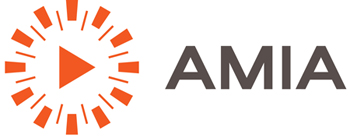2019 Presentations
_________________________________
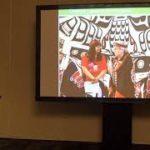 Indigitization:
Indigitization:
Supporting the Digital Preservation of Indigenous Cultural Heritage Where It Lives
Gerald Lawson, University of British Columbia
The Indigitization Program has helped Indigenous community organizations in British Columbia, Canada, to digitize more than 12,000 cassette tapes containing precious fragments of cultural heritage. With the program poised to expand into support for several other media formats, including magnetic video recordings, Gerry Lawson reflects on Indigitization’s grassroots origins, strategic growth and approach to partnerships.
_________________________________
Building Sustainability into Queer Archival Initiatives
Claire Fox, New York University
Kendell Harbin, Roaming Center for Magnetic Alternatives
Louisa Trott, University of Tennessee
Alexandra Juhasz, Brooklyn College
What does queer history look like? What does it sound like? How does it feel? Browsing through an LGBTQ+ media archive might help you find an answer. But how do you find one? Is there one in your town? Can you find materials online? And if you can, how do you know it still exists? This panel brings together three speakers from different queer media preservation initiatives: Kendell Harbin, who runs the Roaming Center for Media Alternatives in libraries across the Midwest; Louisa Trott, who works on the Voices Out Loud Project to preserve East Tennessee’s LGBTQ+ history and culture; and Alexandra Juhasz, who initiated the VHS Archives Working Group at CUNY to consider the connection between migrating tape formats and caring for the people who created them. Together, panelists will think through how a sustainable, accessible queer archive might look, based on their experiences doing the work.
_________________________________
Sustaining The Profession: Continuing Education, Professional Advocacy, and Equity
Yvonne Ng, Witness, Moderator
In 2019 the National Film Preservation Board funded a report on diversity, equity and inclusion in the audiovisual archives field. Working in collaboration with the NFPB’s Diversity Task Force, AMIA fielded a survey for members and the broader archives community gathering data on age, race/ethnicity, sexual identity, level of education, years of professional experience, and other factors to examine how they might interact to affect salary, employment, and professional advancement. The results of that survey, as well as multiple in-person and online forums, resulted in a number of recommendations to address issues of diversity, equity, and inclusion in the audiovisual archives field, as well as new potential collaborations and projects. This session will report on those findings as well as offer an opportunity to discuss the recommendations in an open forum.
_________________________________
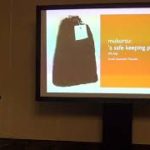 The Work of Indigenous Knowledge in the Age of Digital Reproduction:
The Work of Indigenous Knowledge in the Age of Digital Reproduction:
Some Notes on Relationships
Guha Shankar, Libary of Congress
This presentation looks at the historical production and contemporary re-reproduction of indigenous cultural expressions through a case study of the Ancestral Voices project, a joint initiative of the Passamaquoddy Indian nation, the American Folklife Center at the Library of Congress and the digital tools, Mukurtu CMS and the Traditional Knowledge attribution labels. The presentation will take a detailed look at the ways in which digital tools and platforms are deployed in the preservation of and access to archival media to assist indigenous peoples in sustaining historical memory and strengthening the use and practice of imperiled lifeways within communities. The presentation also highlights the ways in which personal and professional relationships are critical in determining the shape and structure of such initiatives.
_________________________________
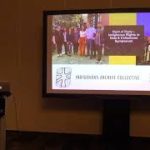 From Time Immemorial: Centering Indigenous Knowledge in Archival Practice
From Time Immemorial: Centering Indigenous Knowledge in Archival Practice
Jennifer R. O’Neal, University of Oregon
Michael Pahn, National Museum of the American Indian Archive Center
This presentation will examine the traditional Indigenous knowledge systems that are at the center of Native American lifeways and culture. We argue that it is imperative that these traditional knowledge systems must be the foundation for the overall care and management of Indigenous archives in non-tribal repositories. Further, we show that applying a decolonizing practice approach will ensure that Indigenous ways of knowing will be centered in the stewardship of collections. Examples of how this work can and should be implemented in repositories are presented to show specific examples and as a call to action.
_________________________________
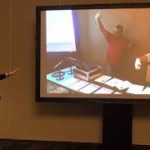 What Can We Do? Community Archiving Workshop and the Role of Professional Associations for Tribal Archives
What Can We Do? Community Archiving Workshop and the Role of Professional Associations for Tribal Archives
Sandra Yates, Texas Medical Center Library
Amanda Castro, Malki Museum
Aaron Saubel, Malki Museum
Open call for roundtable participants,
With the support of AMIA, the Community Archiving Workshop (CAW) has conducted workshops at the annual conference of the Association of Tribal Archives, Libraries, & Museums (ATALM) for the last two years. At the 2019 ATALM conference in Temecula, CA, Malki Museum from Banning, CA was the workshop’s feature collection. The session will summarize the activities of the day-long workshop that took place on October 8th. Amanda Castro, Malki Museum Director, will talk about the museum’s background as California’s First Museum Founded by Native Americans on a reservation, its collections, and its involvement at the ATALM workshop. Other stewards of tribal archives will begin a roundtable discussion about the role of professional associations, like AMIA and ATALM, in supporting tribal archives in the preservation and access of their materials for their communities.
